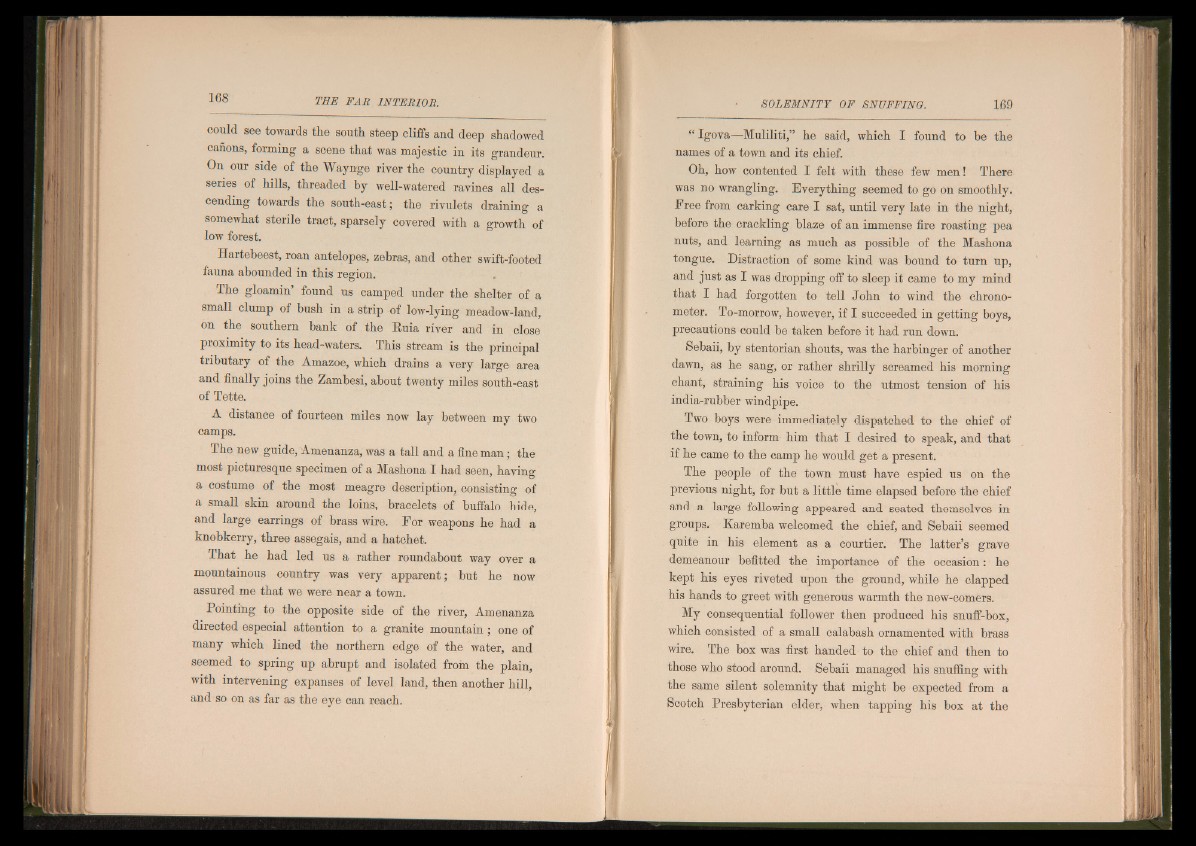
could see towards the south steep cliffs and deep shadowed
canons, forming a scene that was majestic in its grandeur.
On our side of the Waynge river the country displayed a
series of hills, threaded by well-watered ravines all descending
towards the south-east; the rivulets draining a
somewhat sterile tract, sparsely covered with a growth of
low forest.
Hartebeest, roan antelopes, zebras, and other swift-footed
fauna abounded in this region.
The gloamin’ found us camped under the shelter of a
small clump of bush in a strip of low-lying meadow-land,
on the southern bank of the Euia river and in close
proximity to its head-waters. This stream is the principal
tributary of the Amazoe, which drains a very large area
and finally joins the Zambesi, about twenty miles south-east
of Tette.
A d i s t a n c e o f f o u r t e e n m i l e s n o w l a y b e tw e e n m y tw o
c am p s .
The new guide, Amenanza, was a tall and a fine man; the
most picturesque specimen of a Mashona I had seen,7 havinOg
a costume of the most meagre description, consisting of
a small skin around the loins, bracelets of buffalo hide,
and large earrings of brass wire. For weapons he had a
knobkerry, three assegais, and a hatchet.
That he had led us a rather roundabout way over a
mountainous country was very apparent; but he now
assured me that we were near a town.
Pointing to the opposite side of the river, Amenanza
directed especial attention to a granite mountain ; one of
many which lined the northern edge of the water, and
seemed to spring up abrupt and isolated from the plain,
with intervening expanses of level land, then another hill,
and so on as far as the eye can reach.
“ Igova—Muliliti,” he said, which I found to be the
names of a town and its chief.
Oh, how contented I felt with these few men! There
was no wrangling. Everything seemed to go on smoothly.
Free from carking care I sat, until very late in the night,
before the crackling blaze of an immense fire roasting pea
nuts, and learning as much as possible of the Mashona
tongue. Distraction of some kind was bound to turn up,
and just as I was dropping off to sleep it came to my mind
that I had forgotten to tell John to wind the chronometer.
To-morrow, however, if I succeeded in getting boys,
precautions could be taken before it had run down.
Sebaii, by stentorian shouts, was the harbinger of another
dawn, as he sang, or rather shrilly screamed his morning
chant, straining his voice to the utmost tension of his
india-rubber windpipe.
Two boys were immediately dispatched to the chief of
the town, to inform him that I desired to speak, and that
if he came to the camp he would get a present.
The people of the town must have espied us on the
previous night, for but a little time elapsed before the chief
and a large following appeared and seated themselves in
groups, Karemba welcomed the chief, and Sebaii seemed
quite in his element as a courtier. The latter’s grave
demeanour befitted the importance of the occasion: he
kept his eyes riveted upon the ground, while he clapped
his hands to greet with generous warmth the new-comers.
My consequential follower then produced his snuff-box,
which consisted of a small calabash ornamented with brass
wire. The box was first handed to the chief and then to
those who stood around. Sebaii managed his snuffing with
the same silent solemnity that might be expected from a
Scotch Presbyterian elder, when tapping his box at the